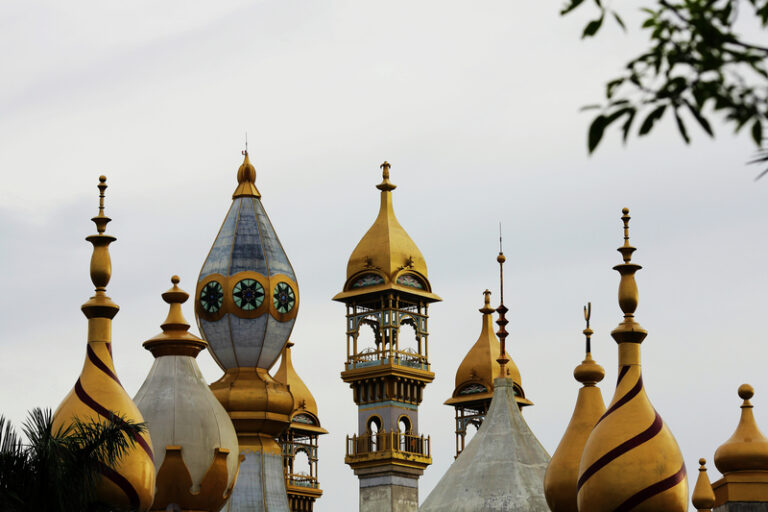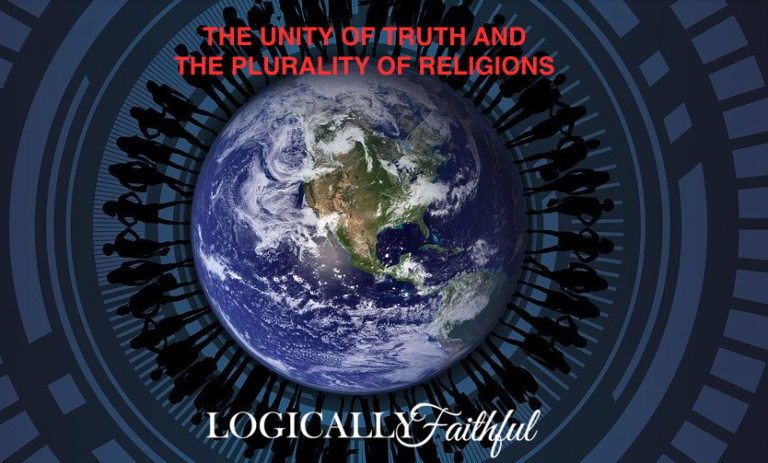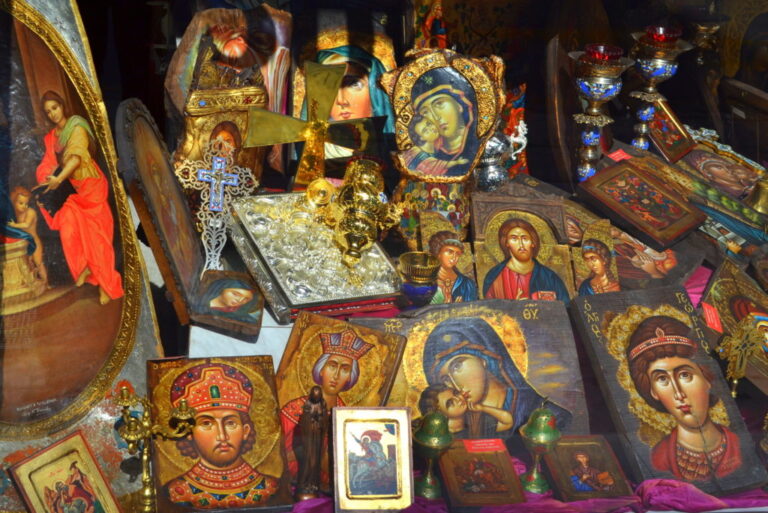How can you spot a false religion or a cult? Simple, they ask you to not ask questions. Cults do not allow their people to engage others who are disagreeing with their doctrine, dogma or opinions. They frown upon their people asking critical, logical or penetrating, probing questions about the truthfulness of their books, teachers or dogmas. They all about brainwashing their people to believe without thinking. Some call it blind faith others call it foolishness. Of course there are exceptions. But over all this is the clue you cannot afford to ignore. David Korseh and Jim Jones are unforgettable examples of false religious leaders whose ideas lead to the deaths of hundreds of people including children (not to mention the spiritual implications as well). Don’t let people get away with telling you “it does not matter what you believe,” lives (and souls) are on the line.
[Are you interested in what the difference between a cult and a religion is? Let me know (respond below) and I will consider posting on this in the near future.]
Clifford Willians wrote the Ethics of Belief in 1877. (Originally published in Contemporary Review) :
If a man, holding a belief which he was taught in childhood or persuaded of afterwards, keeps down and pushes away any doubts which arise about it in his mind, purposely avoids the reading of books and the company of men that call into question or discuss it, and regards as impious those questions which cannot easily be asked without disturbing it — the life of that man is one long sin against mankind…. “But,” says one, “I am a busy man; I have no time for the long course of study which would be necessary to make me in any degree a competent judge of certain questions, or even able to understand the nature of the arguments.” Then he should have no time to believe.
Now, I know there are things in life that are true that one cannot prove. But the advice Williams gives is wise and is not to be ignored, except by those who love their opinions and beliefs more than they do the truth. A true philosopher, or a lover of wisdom is one who seeks truth. In Plato’s Republic, book V, Socrates is asked:
Who then are the true philosophers?
Those, I said, who are lovers of the vision of truth.
Are you a lover of truth? If so, you are one who would be difficult to fool with a false religion or a cult. But even the very elect can be fooled! (Matthew 24:24) We have to learn to beware and never stop asking the critical “truth” questions.
Also, forcing one’s beliefs on another, as ISIS is currently doing in Iraq, (More politically incorrect analysis here) is not only foolish as it defeats the purpose of having genuine convictions that make a difference and create significance in life.
What do you think? Are there other ways to spot a cult or false religion?
PS Now, if you are a Jehovah Witness consider this. Your feedback, all feedback, is most welcome.





This article was very interesting. Though I am an agnostic, this is very helpful for me. I for one like to read up on any religion thrust upon me. Though it is hard to find what is real and what is false. Such as the bad reputation Jehovah Witnesses have, “Lock the door and pretend you’re not home” is something I see frequently in comedy acts or comics I stumble by. Most prefer to deny certain religions, finding them too time-consuming to listen. But, if one were to pick a religion, it’s best to listen to those type of people and question them as they proceed through the teaching. Like said in the article, if they can’t answer those critical questions and dodge answering, then you need to take a step back and rethink your choices. Like Socrates, he had done the same thing to a religious farmer and ended up having his school burned to the ground for his questions and so-called debunking of the farmer’s faith. Cults seem to be just that, a dangerous thing to poke at and be involved in, or you’ll end up meeting your demises in the end. I now wonder if I’d be the perfect bait for a Cult if I had not learned such important questioning skills and critical thinking to uncover what type of religion they truly are.
This is an excellent subject. I love Islam because it is all about truth. It is a religion that is taught as being synonymous with mathematics and science. I have always been taught that if it cannot be proven by one or both of these ways then it is more than likely false. As a young boy, I asked a preacher at a church I used to attend, “Who created God?” and his answer to me was “We’re not supposed to know that.” I couldn’t accept that answer and moved on and found Islam.
Hamadi
If that preacher would have given you an answer to your question, would you have stayed in the church?
It seems it was a lot more than just this reason that made you leave the church, correct?
Also, even in Islam this question cannot be answered “who made God” because this is a trick-question anyway!
Finally what does this have to do with why Islam is growing?
KS
So basically the only way to avoid cults etc. is to ask questions? You would think that going into a new religion people would ask questions and not just randomly give money to the cause without a firm understanding of what they’re getting themselves into.
Jonathan,
Of course more is required, but asking critical questions is a start! 🙂
KS
I must have missed this post! I don’t understand the question Jonathan. Please articulate it.
KS
Pingback: Don’t we all worship the same god? | Logically Faithful
Cults are organized and are about control & losing the individuals free will. They ensure you do not leave them without some harmful ramifications. Apostasy can lead to persecution and death.
Hello Robert!
Yes, that is true, true of some groups. Some are religious and others are sociological cults. But some organizations are “cults” too but not in the sense that you mention. The mormons for example are not like the Jim Jones cults who control and manipulate their people, but nevertheless it is a cult religiously speaking because it claims to be “Christian” but denies the foundations of the Christian faith (the Trinity, the final Scriptures in the Bible, multiple gods etc). The same can be said of the Nation of Islam. It claims to be Islamic but it denies the foundation beliefs of Islam (favoring of the Black race etc). See http://www.muhajabah.com/noi.htm
A few great resources is https://carm.org/cults-outline-analysis
And the book, the Kingdom of the Cults ed by Ravi Zacharias http://www.christianbook.com/kingdom-the-cults-rev-and-updated/walter-martin/9780764228216/pd/228218?event=AFF&p=1011693&
Great to hear from you!!
Good to hear from you as well. It’s always a pleasure to engage in such discourse. There are too many nuances to the meaning of a cult. The Jews in the first century accused Christians of being a cult which in turn helped the Romans persecute Christianity. It can can be argued that Islam is the largest cult in the world in regards to apostasy. The Quran Speaks harshly against apostates and refers to them as losers. The Mormons in comparison to Trintarian Christians are viewed as cultic. The Mormons say that of everyone else who don’t subscribe to their worldview. Cults can be created within & from mainline religions. The worst form of cult is based on deception. Early Christianity dealt with Gnostic Christian cult that vied for acceptance and recognition. Gnosticism seems to have not died since then but has taken visibly formation in the Islamic religion and generally speaking within Christian Protestantism.
Thanks for your thoughts Robert. I was referring to the technical theological or sociologic sense of cult when I was speaking about it, however “cult” has different meanings so it can be confusing!
Also, how is Christian Protestantism a cult?
There are strong elements of Gnosticism in Protestantism vying for authority in their churches. They are like meiosis or in constant state of divisions on the authority of Scriptures and the life of their churches that they take on views that differ from that of their predecessors. One can argue of the thousands of cults within Christian Protestantism. You and I can use the word “cult” in so many contexts to demonstrate deviations & division as well as expound upon the positive/negative impact on the adherents of ancient/or mutant religious institutions.
Thanks for that Robert. Much of what you say is true, but that does not make the Protestantism branch “false” because of the divisions. Eastern Orthodoxy has its divisons too 🙂 http://vaticaninsider.lastampa.it/en/world-news/detail/articolo/ecumenismo-ecumenism-ecumenismo-27006/
or http://www.eastwestreport.org/articles/ew05201.htm
Although, the very nature of denying a central authority like the Patriarch or the Pope, which is essential to Protestantism, can lead to the “Prophet Bob’s” church on the street corner of Harlem!!
KS
I made no statement of Protestantism being false. The impact of Gnosticism is great upon it and has created cults within itself. Yes, there are Prophet Bob’s” church throughout the country. The Orthodox & Catholic Church have their share of splinter groups and have been labeled “cultic”. There may be divisions that we may & do call canonical and uncanonical. However, they are united on the fundamentals of the faith but unfortunately not when it comes to authority.
Are religions not to be judged by the fruits their adherents produce? Are those whose fruits, when encountering what is Other to them ,are hospitality and solidarity rather than opposition and hostility more likely to truly reflect the existence of a good creator?
Source— Why did Jesus, Moses, The Buddha and Mohammed Cross The Road? Brian McLaren
The fruits? These are important! Yes. But even Hamas and ISIS feed their people and help the aged–after they tear their worlds’s apart. We need to look at the reasons for their beliefs not just their fruits. Both are important.
Amway and Herbal Life have major conferences about how to make more money…many of the people there are kind and do good. Moralism is dangerous too.
https://carm.org/what-is-moralism
Hello Dr. Sweis,
The example of the Waco Texas incident it seems to be a crystal clear incident of “Brainwashing” or is it a prolonged example of a false religion orchestrated by their leaders David Korseh and Jim Jones? The Islamic religion have some radical-thinking individuals that kill in the name of Allah, an example, ISIS. So is this group considered a cult or is the Islamic religion a false religion, in it’s entirety?